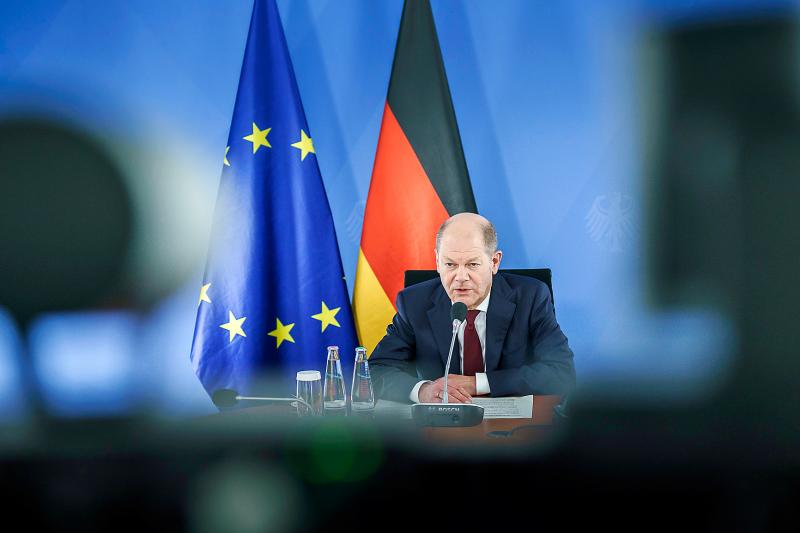US President Joe Biden declared “total” unity among Western powers on Monday after crisis talks with European leaders on deterring Russia from an attack against Ukraine, while the Pentagon said that 8,500 US troops were put on standby for possible deployment to boost NATO.
“I had a very, very, very good meeting — total unanimity with all the European leaders,” Biden told reporters shortly after finishing a 1 hour, 20 minute videoconference with allied leaders from Europe and NATO.
German Chancellor Olaf Scholz said: “It is up to Russia to undertake visible de-escalation,” while NATO Secretary-General Jens Stoltenber warned of “severe costs” if there is “any further aggression” by Moscow against Ukraine.

Photo: EPA-EFE
Also on the call were the leaders of France, Italy, Poland and the EU.
Despite insisting he has no intention of attacking, Russian President Vladimir Putin has deployed about 100,000 troops close to Ukraine.
Moscow is demanding a guarantee that Ukraine, a former Soviet republic, never be allowed to join NATO, but the US and NATO have rejected the Russian demands and told Putin to withdraw from Ukraine’s borders.
In Washington, Pentagon spokesman John Kirby said that a force of up to 8,500 US troops was on “heightened alert” for potential deployment to reinforce any activation of the NATO Response Force in the region, where there are growing fears of spillover from the Ukraine conflict.
“What this is about ... is reassurance to our NATO allies,” Kirby said. “It sends a very clear signal to Mr Putin that we take our responsibilities to NATO seriously.”
NATO also said it was sending jets and ships to bolster its eastern flank.
The tension helped fuel instability in global markets, while Russia’s main stock index plunged and the central bank suspended foreign-currency purchasing after the ruble slumped.
The French government announced that Russian and Ukrainian officials would meet, along with their French and German counterparts, in Paris today to try to find a way out of the impasse.
Yesterday, British Secretary of State for Foreign, Commonwealth and Development Affairs Liz Truss said that she would visit Ukraine next week.
“I’ll be visiting Ukraine next week,” Truss told the British parliament.
“A further military incursion by Russia into Ukraine would be a massive strategic mistake and come with a severe cost on Russia’s economy, including coordinated sanctions,” she said.
Yesterday, Ukraine said that it had dismantled saboteurs controlled by Moscow who were preparing a series of attacks in Ukraine’s border regions to “destabilize” the situation.
The men were planning a “series of armed attacks” on city infrastructure, Ukraine’s security service, the SBU, said in a statement, adding that the group was “coordinated by Russian special services.”
The SBU said it arrested two residents of Ukraine, one of them a Russian citizen, and seized “an explosive device, small arms and ammunition.”
The two acted in Kharkov, a city with 1 million people located near the Russian border in the east, and in the town of Zhytomyr in central Ukraine, under the pretext of recruiting personnel for a private security firm, the SBU added.
A source in law enforcement said that the two men were former commandos with combat experience and were recruiting “mainly” Russians who had already committed violent crimes.
Additional reporting by Reuters

The Ministry of the Interior (MOI) is to tighten rules for candidates running for public office, requiring them to declare that they do not hold a Chinese household registration or passport, and that they possess no other foreign citizenship. The requirement was set out in a draft amendment to the Enforcement Rules of the Public Officials Election and Recall Act (公職人員選舉罷免法 ) released by the ministry on Thursday. Under the proposal, candidates would need to make the declaration when submitting their registration forms, which would be published in the official election bulletin. The move follows the removal of several elected officials who were

The Republic of China (ROC) is celebrating its 114th Double Ten National Day today, featuring military parades and a variety of performances and speeches in front of the Presidential Office in Taipei. The Taiwan Taiko Association opened the celebrations with a 100-drummer performance, including young percussionists. As per tradition, an air force Mirage 2000 fighter jet flew over the Presidential Office as a part of the performance. The Honor Guards of the ROC and its marching band also heralded in a military parade. Students from Taichung's Shin Min High School then followed with a colorful performance using floral imagery to represent Taiwan's alternate name

FOUR DESIGNATED AREAS: Notices were issued for live-fire exercises in waters south and northwest of Penghu, northeast of Keelung and west of Kaohsiung, they said The military is planning three major annual exercises across the army, navy and air force this month, with the navy’s “Hai Chiang” (海強, “Sea Strong”) drills running from today through Thursday, the Ministry of National Defense said yesterday. The Hai Chiang exercise, which is to take place in waters surrounding Taiwan, would feature P-3C Orion maritime patrol aircraft and S-70C anti-submarine helicopters, the ministry said, adding that the drills aim to bolster the nation’s offshore defensive capabilities. China has intensified military and psychological pressure against Taiwan, repeatedly sending warplanes and vessels into areas near the nation’s air defense identification zone and across

A Chinese takeover of Taiwan would severely threaten the national security of the US, Japan, the Philippines and other nations, while global economic losses could reach US$10 trillion, National Security Council Deputy Secretary-General Lin Fei-fan (林飛帆) wrote in an article published yesterday in Foreign Affairs. “The future of Taiwan is not merely a regional concern; it is a test of whether the international order can withstand the pressure of authoritarian expansionism,” Lin wrote in the article titled “Taiwan’s Plan for Peace Through Strength — How Investments in Resilience Can Deter Beijing.” Chinese President Xi Jinping’s (習近平) intent to take Taiwan by force